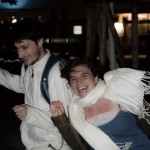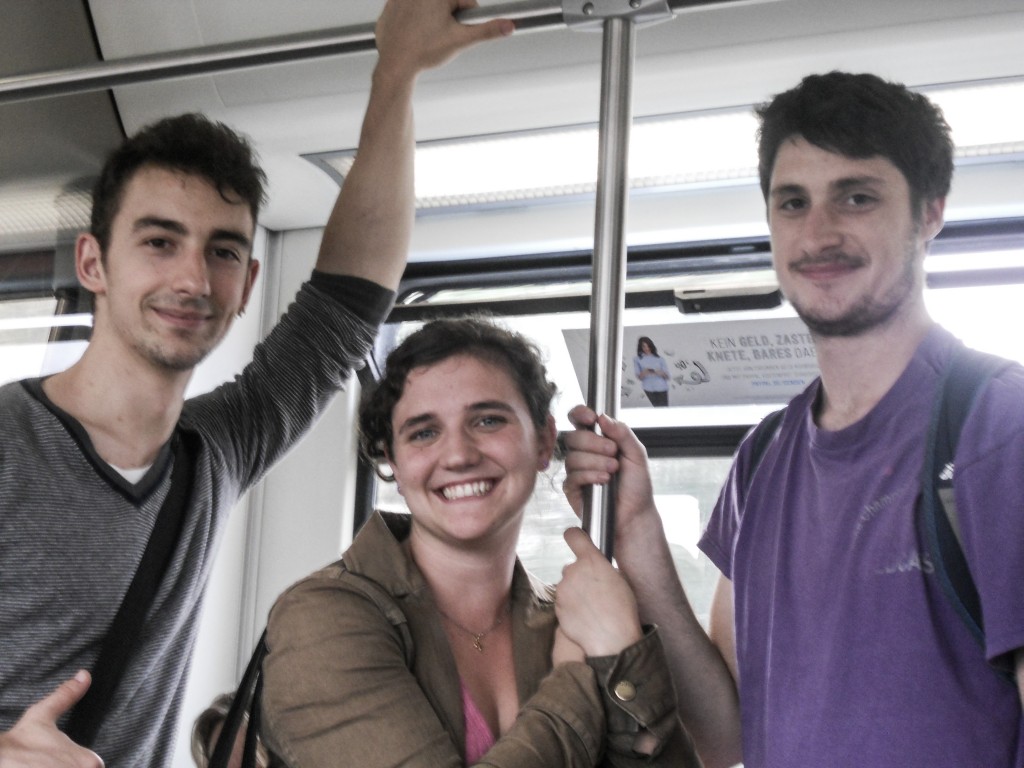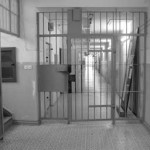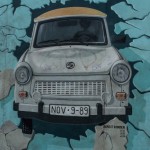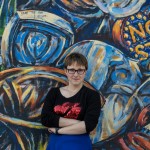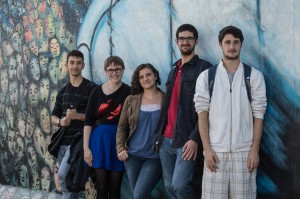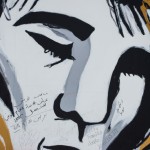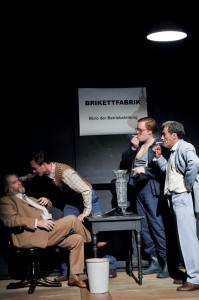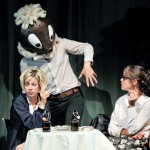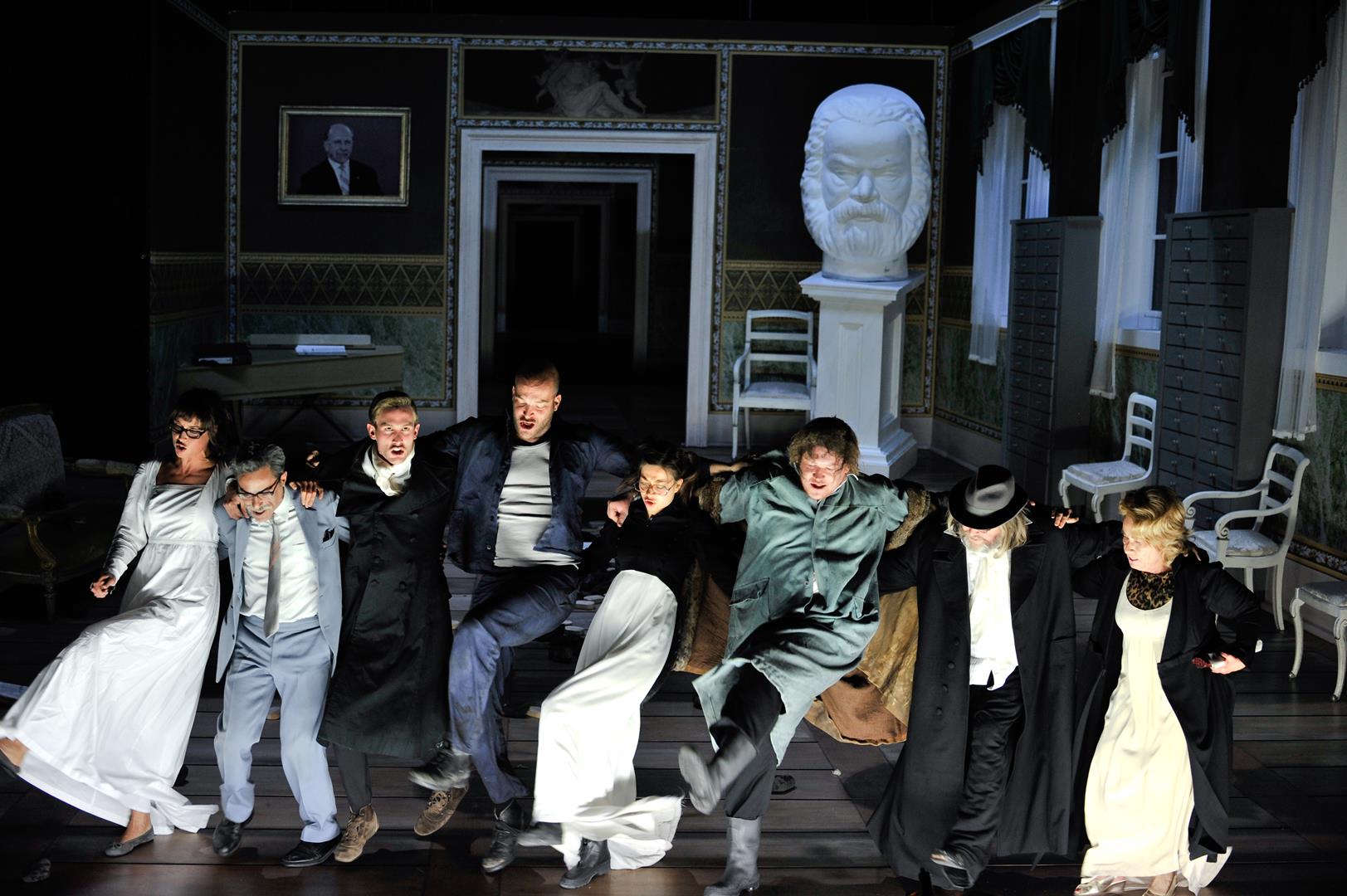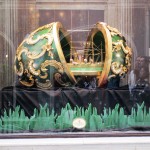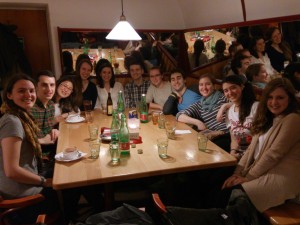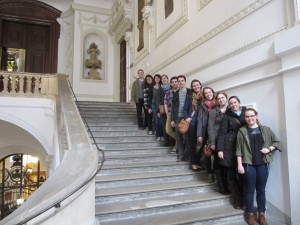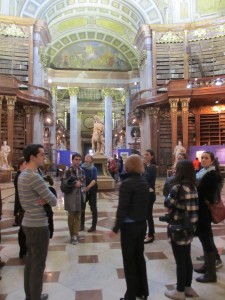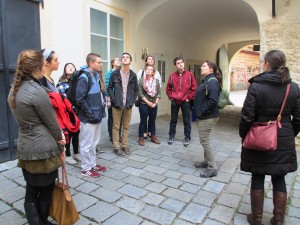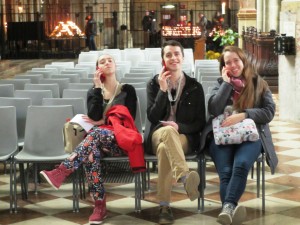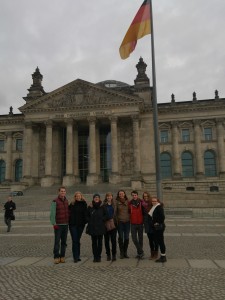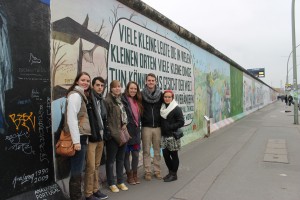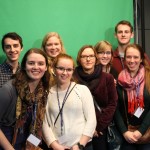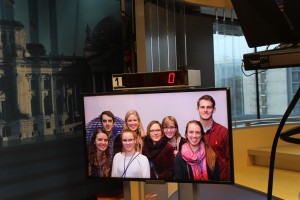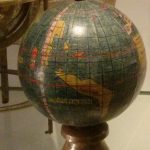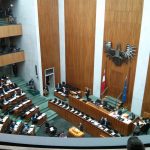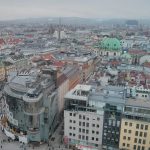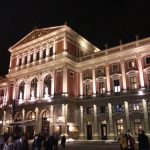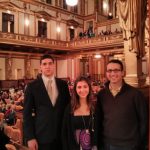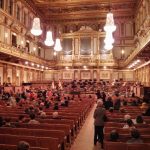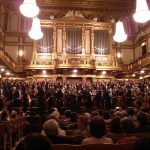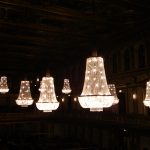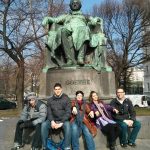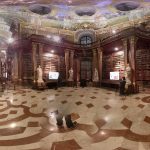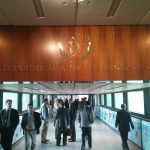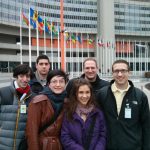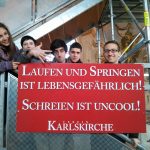by Gwyneth van Son
Take an overload of German culture, literature and history, add in a sprinkle of physical endurance and you have Dickinson-in-Bremen’s May excursion to Berlin and Weimar. The excursion was spread out over seven days, five in Berlin, Germany’s capital, and two in the smaller town of Weimar. We arrived in Berlin on Sunday night and began our adventures Monday morning.
Part I: Berlin
State Department (Auswärtiges Amt)
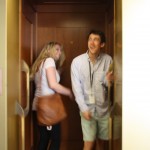
Steph + John G., like anyone, love to ride a “Paternoster” – the picture can’t be sharp.
We started the week off by going to a famous landmark in Berlin, the TV tower. From the tower we were able to see a 360 degree view of the city. We spent several hours looking out and identifying the many sights we would be seeing throughout the week. After gazing out at the city, we journeyed to the Auswärtiges Amt, The Federal Foreign Office. We were scheduled to meet with Harald Leibrecht, the Coordinator of Transatlantic Cooperation in the Field of Intersocietal Relations, Cultural and Information Policy, but sadly he had an important last minute engagement with people holding equally long titles. We received a tour and history lesson of the Auswärtiges Amt from Mrs. Stemmler, Mr. Leibrecht’s personal assistant. She took us through the building and explained to us its extraordinary history – it used to be the National Bank in the Third Reich and, after the war, housed first the Ministry of Finance of the GDR and later the Central Committee of the Socialist Union Party of the GDR (Zentralkomitee der SED), t.i. the de facto government. At the end of the tour, we enjoyed the view over the city from the terrace and had lunch in the cafeteria where the government officials eat.
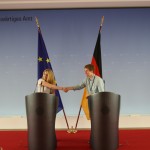
Steph and John sealing a contract
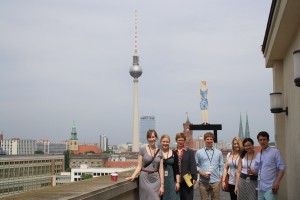
Gwynnie, Verena, Mrs. Stemmler, John P., Steph, Emily, John G. (from left to right) on the terrace
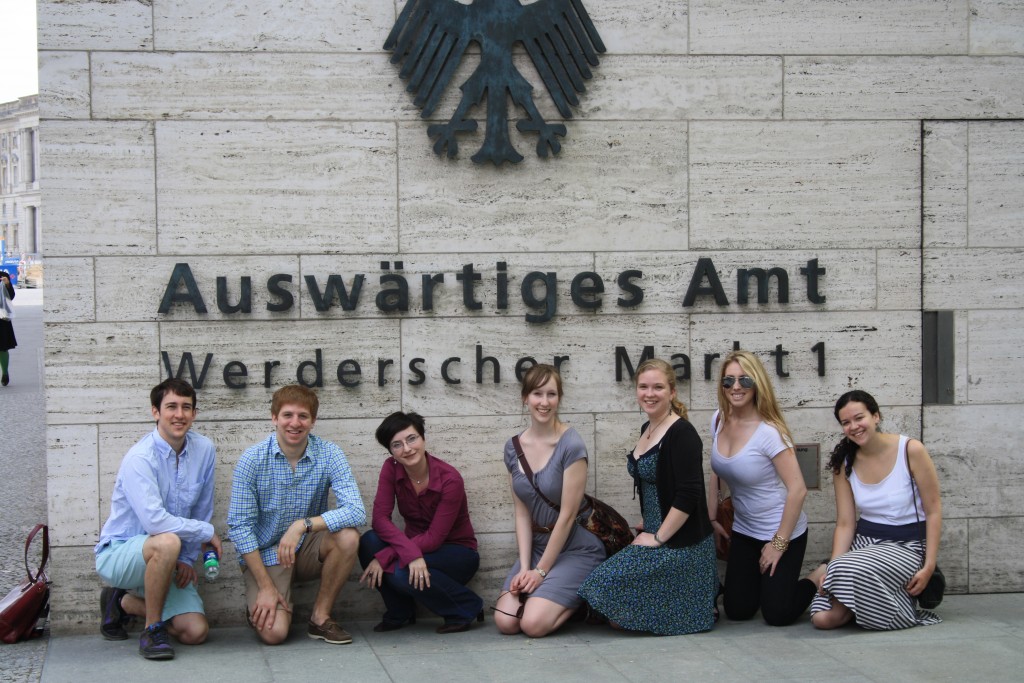
John G., John P., Dr. Janine Ludwig, Gwynnie, Verena, Stephanie, Emily (from left to right).
After our tour we had the afternoon free. Verena and I met up with a former Dickinson German Teaching Assistant, Insa Kohler, as well as Dickinson Alumn and German major, Ian van Son, my brother, both of whom are currently living in Berlin. We visited the Bernauer Straße Wall Memorial, were parts of the wall separating East and West Berlin still stand in their original place. The Memorial tells the story of that part of the wall from it’s building, to the lives that were lost there, the stories of those separated by it and to its being torn down. The memorial is entirely outside, with sections of the concrete wall standing, one section of only steel reinforcement beams as well as a memorial for where a church once stood until it was demolished by the GDR. One part is exactly how the wall actually was, two walls with a guard tower and no-mans-land in between. Throughout the open space of the memorial there are steel pillars with information plaques in German and English, some of them even have little televisions allowing the viewer to see actual video footage of life along the Bernauer Straße Wall. Afterwards it was back to the hotel to rest up for yet another full day ahead of us.
Sanssouci Castle – Frederick the Great
Tuesday morning was an early one; we were out of the hotel and on our way to Schloss Sanssouci at 8am, only to realize it was already very warm outside. The palace was built by Friedrich II. King of Prussia as his summer residence and is located slightly outside of Berlin, it is certainly something to be seen. The palace itself is not of an impressive size, but the rococo style, extensive gardens and smaller outlying buildings make it a worth while visit. The gardens are immaculately kept and a series of terraces lead up to the palace, making it seem more of an imposing building then it actually is. There is an orangery with apartments inside, a Chinese style house and a large windmill located on the palace’s property.
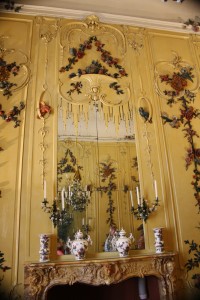
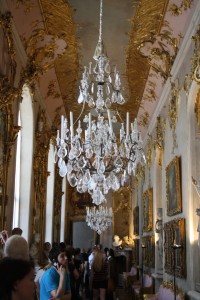
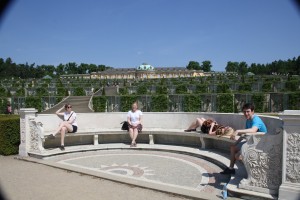
Sans souci – without worries in the former summer residence of Frederick the Great in Potsdam: Gwynnie, Verena, Steph, John
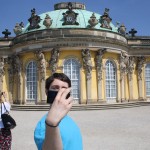
Selfie in front of the castle: John Gallagher
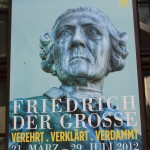
Exhibition poster
After our sunny visit to the palace we continued our Prussia day with a visit and tour of the German History Museum, which had a special exhibition on Friedrich II. a.k.a. Frederick the Great, also nicknamed The Old Fritz. On our guided tour we saw the shirt in which Friedrich died as well as his death mask and learned of his family history and his life story. Friedrich was an avid flute player, successful military leader, and had no children of his own. Friedrich’s strong German image was used by Hitler and Goebbels for propaganda purposes, internationally tarnishing his name for a certain period of time. Prof. Ludwig told us more about the peculiar biography of this emperor – who used to be a delicate, art-loving child and was beaten by his father into a grim belligerent emperor. “Hunde, wollt Ihr ewig leben?,” is what he supposedly said to his soldiers dying for him. Yet at the same time, he was known for his (religious) tolerance and for embracing enlightenment – at least to a certain point: “Räsonniert, soviel ihr wollt und worüber ihr wollt, aber gehorcht!” (Ponder as much as you want, on whatever you want, but obey!”) In Sanssouci, he gave exile to Voltaire who was expelled from France for his critical ideas. 2012 is the 300th birthday anniversary of this enigmatic king, and many institutions in Berlin deal with his life, such as the exhibition in the German Historic Museum (Deutsches Historisches Museum) which specifically examines his ambivalent legacy – of course, we had a tour there, too.
While in the museum we also discovered video footage of the War College in Carlisle, Pennsylvania because they have a Friedrich II. statue on their property. No matter where we are in the world, somehow Carlisle manages to find us. After a day of filling our minds with Prussian history and burning our skin in the unrelenting sun we were unleashed into the humid evening, with about as much energy as a group of napping sloths.
Meeting with Wolfgang Thierse
As the hot Wednesday morning sun started beating down on Berlin we rose and donned our business clothes for a meeting with a very prominent German Politician, Wolfgang Thierse. Mr. Thierse grew up in the GDR and managed to be one of the few East German politicians who has been successful since the reunification of Germany. Mr. Thierse is also an incredibly friendly man, he is extremely busy, but still managed to spend an hour answering American students’ questions. After our meeting with Mr. Thierse we spent the afternoon in the GDR museum. The museum is very small and was crowded (mostly with noisy French teenagers), but is very interesting. The museum is interactive and you are allowed to touch just about everything. We spent several hours discovering just how different life was in communist Germany, from what people ate, to how they lived, or what they wore. There was a prison cell, a secret police interrogation room, information about those who tried to escape and those who lost their lives.
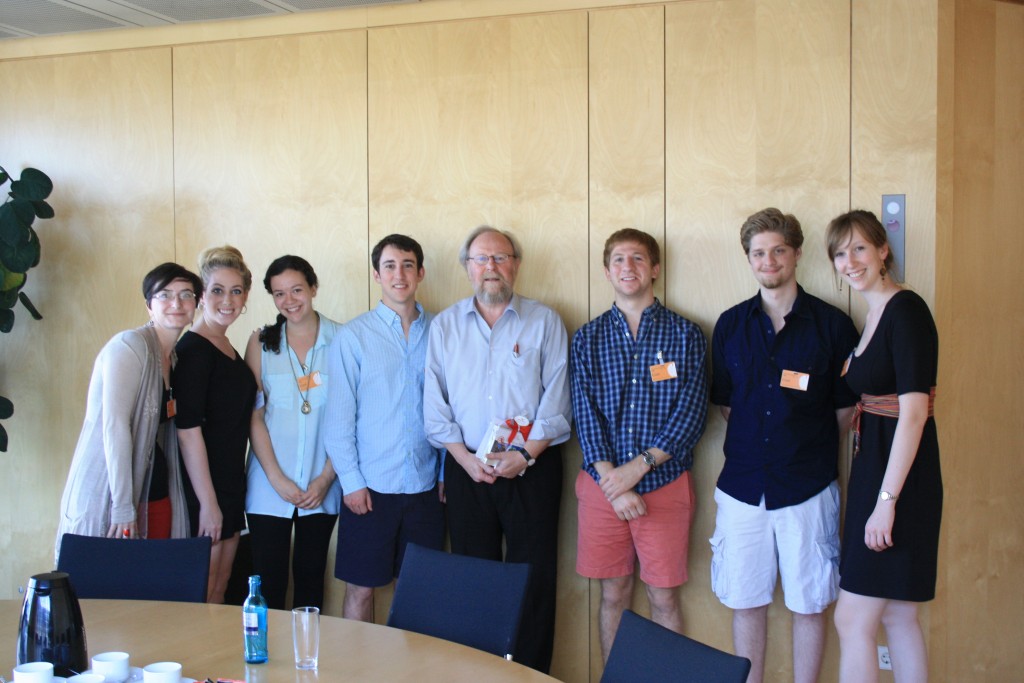
Janine Ludwig, Stephanie, Emily, John G., Wolfgang Thierse, John P., Jeff, Gwynnie (fr. l. to r.)
Literature days: GDR literature / Georg Büchner / Igor Kroitzsch / Heiner Müller
We continued our GDR education by visiting the Humboldt University, one of the most prestigious and well known universities in Germany, where we saw the Heiner Müller Archive / Transitraum and had a lecture on GDR literature. Müller was a famous, envelope-pushing, East German playwright and author. The archive was his private library, which was donated to the university after his death and is curated by Dr. Kristin Schulz.
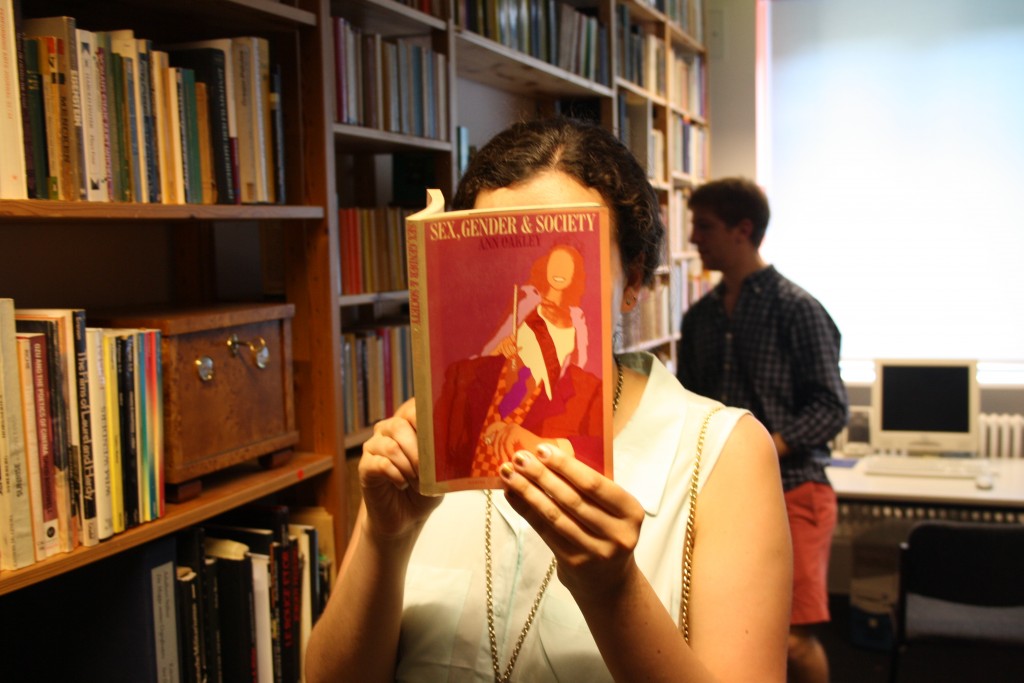
Emily delving through Heiner Müller’s personal books – who would have thought the German playwright, often accused of depicting violent female pictures, has read feminist literature?!
After we meandered around Müller’s book collection for a while, we moved on to a two-hour lecture on GDR literature given to us by an expert on GDR poetry, Dr. Peter Geist. He vividly described the historical circumstances and developments of literature in East Germany and also the situation of writers and intellectuals around and after 1989. Thanks to the renowned Prof. Dr. Frank Hörnigk, we were able to hold this seminar in his office in the HU. Afterwards, we had dinner in a nearby restaurant in Friedrichstraße which serves traditional German cuisine. Wednesday evening found us in the German Theatre taking in Verkommenes Ufer, a play by Heiner Müller. The play consisted of three actors, two of which told the story of Medea and the Golden Fleece and the third recited Müller’s poem of why he would no longer write plays after the demise of socialism.
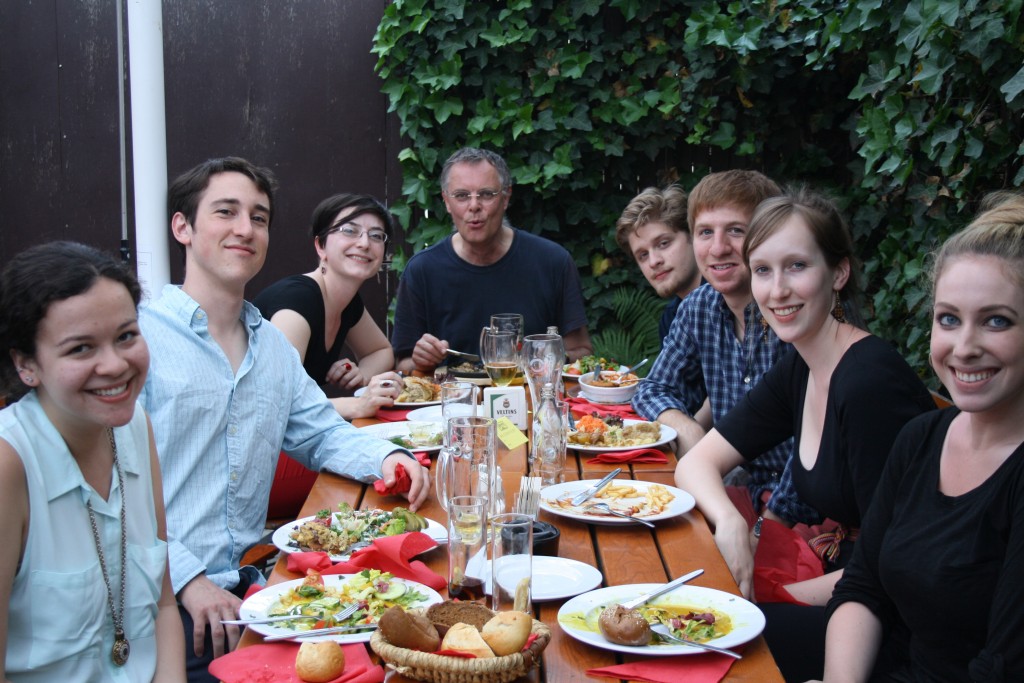
Emily, John G., Janine Ludwig, Dr. Peter Geist (middle), Jeff, John P., Gwynnie, Steph (fr. l. t. r.)
Thursday was a far more relaxing day as we had free time until our appointment at the Parliament building in the afternoon. Even the weather was slightly more relaxing with the hot sun taking a break and allowing for a cool breeze to accompany Verena, my brother and me on our trip to the East Side Gallery. This open air gallery is made up of several long sections of the original Wall, which are decorated by many different artists and change every few years. Some of the paintings are political, some are ridiculous and I don’t even know what some of them where supposed to be. That afternoon we went to the Parliament building to silently watch a plenary session. It was very interesting to see how the government works in Germany, even though we didn’t really know what they were talking about and voting on and there weren’t that many representatives there. After sitting in on the session meeting, we took an audio guided tour of the large glass dome that sits directly above where we had been sitting moments before. The glass dome is open at the top allowing fresh air to flow directly down into the session room below it. There is even a special vacuum contraption that sucks out rain water and keeps it from raining in doors. From the top of the glass dome, you can look over Berlin while the audio guide tells you what you are looking at and why it is important.
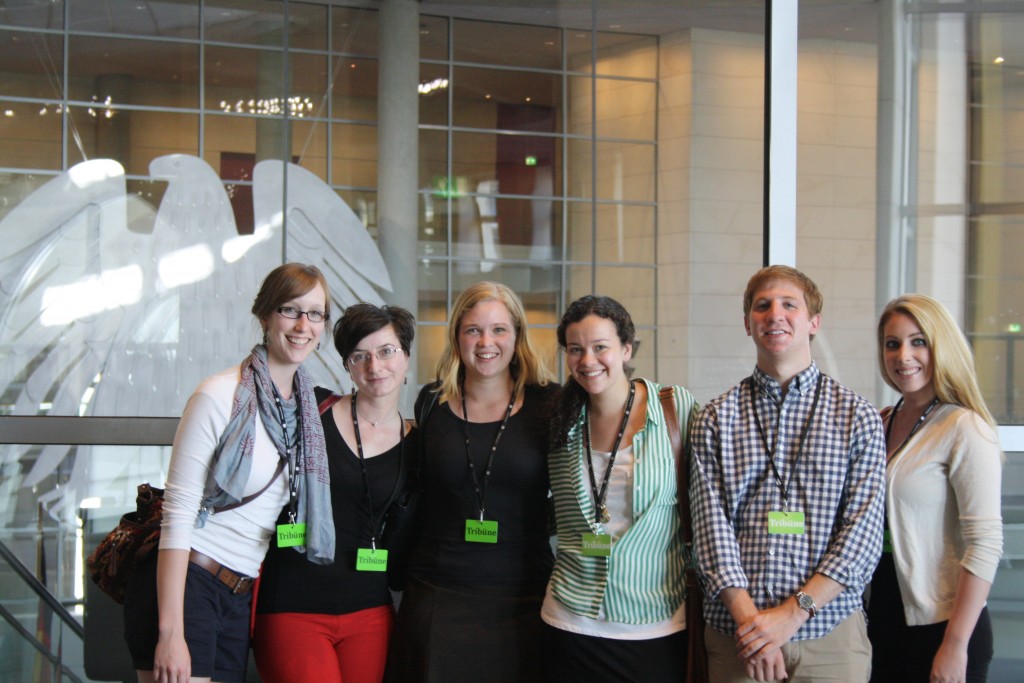
Gwynnie, Janine Ludwig, Verena Mertz, Emily, John P. in the German Reichstag / Bundestag (parliament session)
That night we returned to the Humboldt Uni rsp. the Heiner Müller Archive for a special event organized for us by Prof. Ludwig, in the run-up to the big Büchner anniversary next year (200th birthday anniversary of the ingenious writer Georg Büchner): The German playwright Igor Kroitzsch presented an unpublished play of his, Thermidor, which is a perpetuation of Büchner’s Danton’s Death – read by an actor. Both plays are about the French revolution, a topic that Müller himself wrote about in his play Der Auftrag. The event was attended by other intellectuals, theater experts and practitioners interested in either Kroitzsch or Müller and proved to be very interesting and successful. The event was a cooperation of Dickinson College with the International Heiner Müller Society and the Transitraum.
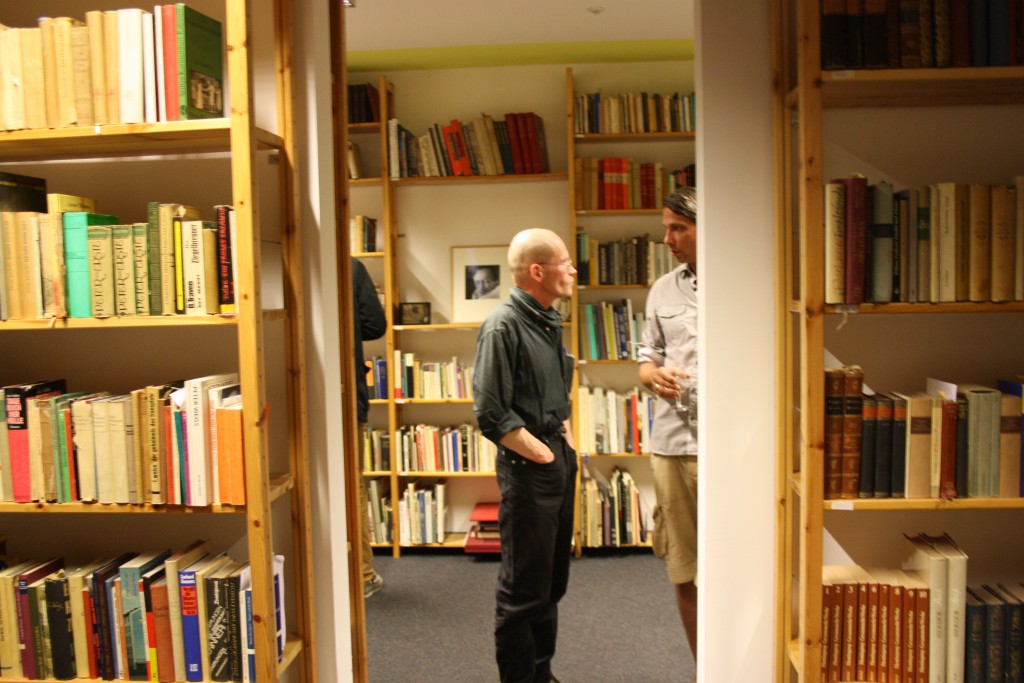
Playwright Igor Kroitzsch (left) talking to Hannes Hametner, theater director.
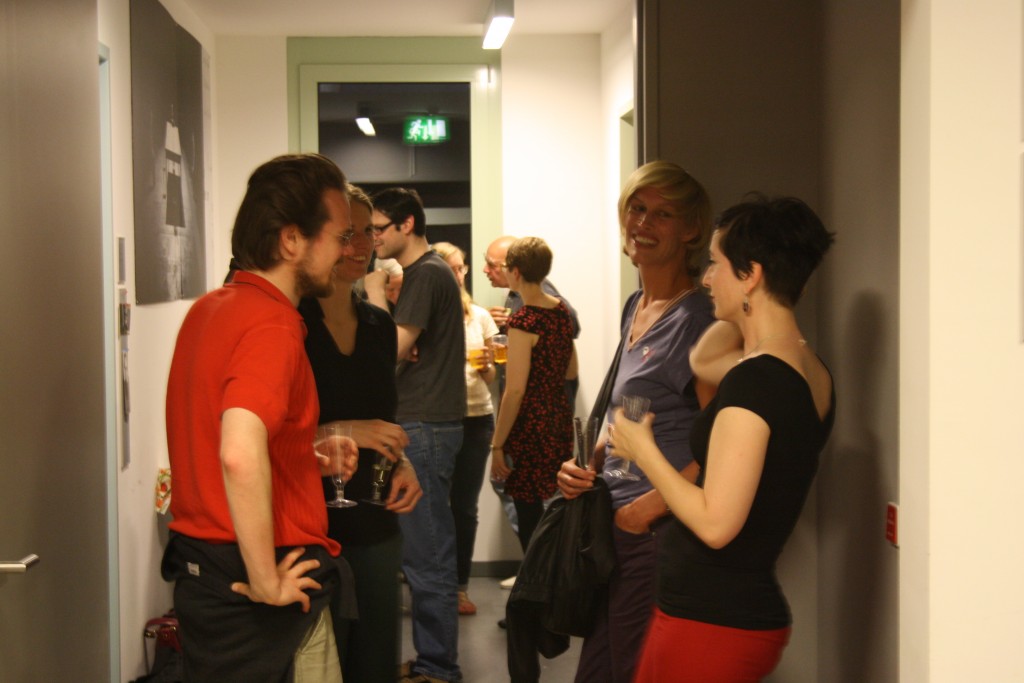
Johannes Wenzel (theater director), Mirjam Meuser (literary scholar), Anja Quickert (Executive Secretary of the Müller Society), Janine Ludwig (Academic Director) at the reception afterwards
Stasi Archive and tunnel tour
Friday was our last day in Berlin and was of course packed with activities. We started the day by going to the Stasi Office Building and Archive. We had a guided tour of the old East German secret police’s headquarters which is now a museum. We saw the offices of the top officials with its communist decoration and technology. In the Archive, we were able to see all of the documents the secret police collected on East German citizens, from the identity cards to the bookcases full of files. We were even shown the different kinds of paper shredding the Stasi did in efforts to conceal the information they had collected. After our visit to the Stasi Museum, we made our way to a restaurant for lunch where we were met by Sarah McGaughey, a Dickinson Professor of German currently based in Tübingen during her year of sabbatical. Prof. McGaughey just happened to be in Berlin for a conference at the same time as our excursion and took some time to meet up with us. After lunch, we went on an underground tour of Berlin. This tour took us in tunnels connected to the metro system, tunnels created during the Third Reich and tunnels that were monitored by East German police in attempts to keep people from fleeing to the west. While under the streets of Berlin, we learned about tunnels that were dug by East Germans trying to make their way over to the west. Most of these escape tunnels were dug along the Bernauer Straße which is where the wall memorial is today. We also heard of people who attempted to escape through the metro tunnels until the Eastern police discovered it and placed metal spikes along the tracks. It was fascinating to be in the quiet and cool after being above ground in the relentless noise and heat of Berlin above ground. The tour ended at the Bernauer Straße where we were shown several buildings from which escape tunnels had been dug and the stories that went along with them. The end of the tour was also the end to our excursion in Berlin. We collected our luggage and made our way to the train station where the speed train took us to Weimar, a few hours south west of Berlin.
Part II: Weimar
First day: Goethe and Schiller
Saturday marked our first day of full program, and a full day it was. We were taken around Weimar by Christoph Schmälzle, an expert on Goethe, Schiller and former personal referent to the President of the Weimar Classic Foundation. He was kind enough to take us around the city he knows everything about and share a large amount of that knowledge with us. I truly believe there is not a question that man could not answer. We started our day at the Fürstengruft which is the crypt for the royals of Weimar. However, this crypt contains not only the remains of royals, but also that of Goethe. Schiller also has a coffin there, however, it is empty, because, much like Mozart, no one knows where the body of the famous writer is. Attached to the back of the crypt is a Russian Orthodox Chapel because one of the Duchesses was Russian, therefore meaning she had to be buried on both Russian soil and in a Russian Orthodox Chapel. Because she was married to the Duke of Weimar who had to be buried in that crypt, Russian soil was brought to Weimar and the chapel built so that husband and wife could be placed next to each other in death. After our morning dose of death and history we went on to Goethe’s House which is right in the center of Weimar. Goethe received this house as a gift from the Duke of Weimar and is quite large and was remodeled to be more like an Italian Palazzo, which Goethe saw during his journey through Italy. Goethe possessed a large quantity of Italian art which is displayed throughout the house. At the back of the house is Goethe’s study where he wrote some of the most famous works of German literature and also collected different kinds of rocks. The study looks out onto a large and luxurious garden. We took a short break for lunch and then meandered down the pedestrian zone to Schiller’s house. Schiller’s house is far less extravagant compared to Goethe’s house, with no area for horse and carriage to arrive, no large entry way with high ceilings and no beautiful garden in the back. Unlike Goethe, Schiller was not born into a rich family and was not a close friend of the Duke, who actually asked Goethe to move to Weimar. Schiller lived in many different houses throughout his life, but this was his final house where he and his family lived for several years before his death. The house is three floors with a large modern museum attached to it at the back. The house faces directly on to the walking and shopping street in Weimar, but some how manages to keep its old charm. Schiller tended to work late into the night and therefore had his study on the top floor of the house, complete with his own small bed.
The marathon day continued with, of course, a church. The church is quite small with a small grave yard containing the graves of Schiller and Goethe’s wives. There is a small mausoleum where many bodies, including Schiller’s, were placed, which is why there is the question of if the bones that are supposedly Schiller’s are actually his. After our church visit we made our way to the Ducal Castle. Because our tour guide, Mr. Schmälzle, had previously been the head of the castle museum and the castle itself, we were privy to a behind the scenes tour and a master key to the whole complex. We started in the basement, seeing the work being done to restore the castle after its years of neglect and alterations during communist rule in Germany. We toured the main rooms, the attics, the room dedicated to Schiller, the Duchess’s winter sunroom, current offices and many more. The castle is huge and in a large square with endless passage ways and rooms, making it the perfect place for an epic game of hide and seek. There had been many additions down to the castle over the years, with some of them not fitting architecturally with others, such as doors leading to nothing but a wall. There was no part of the castle that Mr. Schmälzle did not know about. We finished our tour sipping champagne on a balcony looking out onto the gardens and the regular tourists below us. It was quite a classy affair and the most in depth and amazing tour I have ever had of a castle. A master key truly makes quite a difference. Our night ended with dinner at a local restaurant watching the Eurovision song contest, which was sadly not won by Germany, but rather by Sweden. However, even if Germany had won the contest I don’t believe we had enough energy left to celebrate.
Second day: Glamour and gloom of the city of Weimar
Sunday marked the last day of our excursion. We started the day with a tour of a baroque library, the Anna-Amalia-Bibliothek. While not in the castle, the library was owned by the Duchy of Weimar. Despite suffering a severe fire, the library is still spectacular, full of old books, ornamentation and painted in a light blue color. The library is beautiful and full of light, making the idea of grabbing a book and sitting in a window seat all afternoon incredibly appealing. After the library, we made our way out into the sun and were given a tour of the castle gardens and Goethe’s garden home, located only a short walk from the castle. During the time of Goethe, the gardens were open to the public and where a place where every citizen of Weimar could go for an afternoon walk. Goethe’s garden house is a smaller house where he could go in the summer and write. The duke could walk from his castle to Goethe’s little house and speak with his close friend whenever he pleased. Goethe viewed this house and the gardens surrounding it to be his own little paradise in Weimar.
After our morning of beautiful ornamentation and beautiful nature, we had lunch and moved on to the ugly side of Weimar’s history. Not far outside of the city and on a hill is the concentration camp, Buchenwald. During the Second World War the citizen’s of Weimar were able to smell the crematoriums up on the hill making them aware of the horrors taking place outside of their culturally rich and idyllic town. There are only a few buildings left completely standing at the huge concentration camp, but those buildings are more then enough to make clear what life was like for those imprisoned there. For some of us this was the second concentration camp on which we had ended our excursion, but that didn’t make the tour any less difficult. We had spent the weekend learning of Weimar’s rich culture and enjoying its beauty, but it was important to see the stain of history that many wish to forget. Weimar truly is a city full of history and culture, both the good and the bad. After several hours touring the concentration camp we returned to our hotel, collected our luggage and made our way home by train. Our stepping on to the train home marked the end of Dickinson-in-Bremen’s final excursion of our junior year abroad. We had an amazing week of German history, culture and blazing sun, returning to the slightly chilly north with two more months of calling Bremen home.
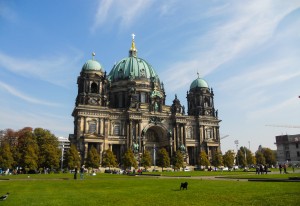 Definitely one of the most beautiful buildings in Berlin (in my opinion), the Dom overlooks a flowing river on one side and the beautiful Lust Garden on the other. The inside of the Dom is ornate and beautiful. The most breathtaking moment, however, is reserved for the view you get when you climb all the stairs, circle the dome, and see Berlin sprawled out before you. >Rachel Schilling ‘16<
Definitely one of the most beautiful buildings in Berlin (in my opinion), the Dom overlooks a flowing river on one side and the beautiful Lust Garden on the other. The inside of the Dom is ornate and beautiful. The most breathtaking moment, however, is reserved for the view you get when you climb all the stairs, circle the dome, and see Berlin sprawled out before you. >Rachel Schilling ‘16<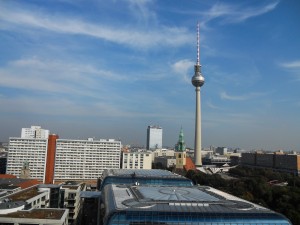 This was the first place in Berlin where I could feel the energy of the city. Live music, literal carnival rides, Trams begging for the opportunity to turn you into a statistic, Döner kebap and Currywurst stands everywhere, and even people bungee jumping off of skyscrapers; it was surreal. Luckily, Alexanderplatz is a main transit junction and I was able to explore this area multiple times. >George DeRosa ‘16<
This was the first place in Berlin where I could feel the energy of the city. Live music, literal carnival rides, Trams begging for the opportunity to turn you into a statistic, Döner kebap and Currywurst stands everywhere, and even people bungee jumping off of skyscrapers; it was surreal. Luckily, Alexanderplatz is a main transit junction and I was able to explore this area multiple times. >George DeRosa ‘16<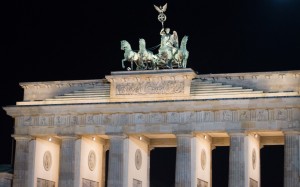 A symbol reminding us of Germany and Europe’s checkered past and also a symbol for peace. It’s very impressive to see at night.
A symbol reminding us of Germany and Europe’s checkered past and also a symbol for peace. It’s very impressive to see at night.

